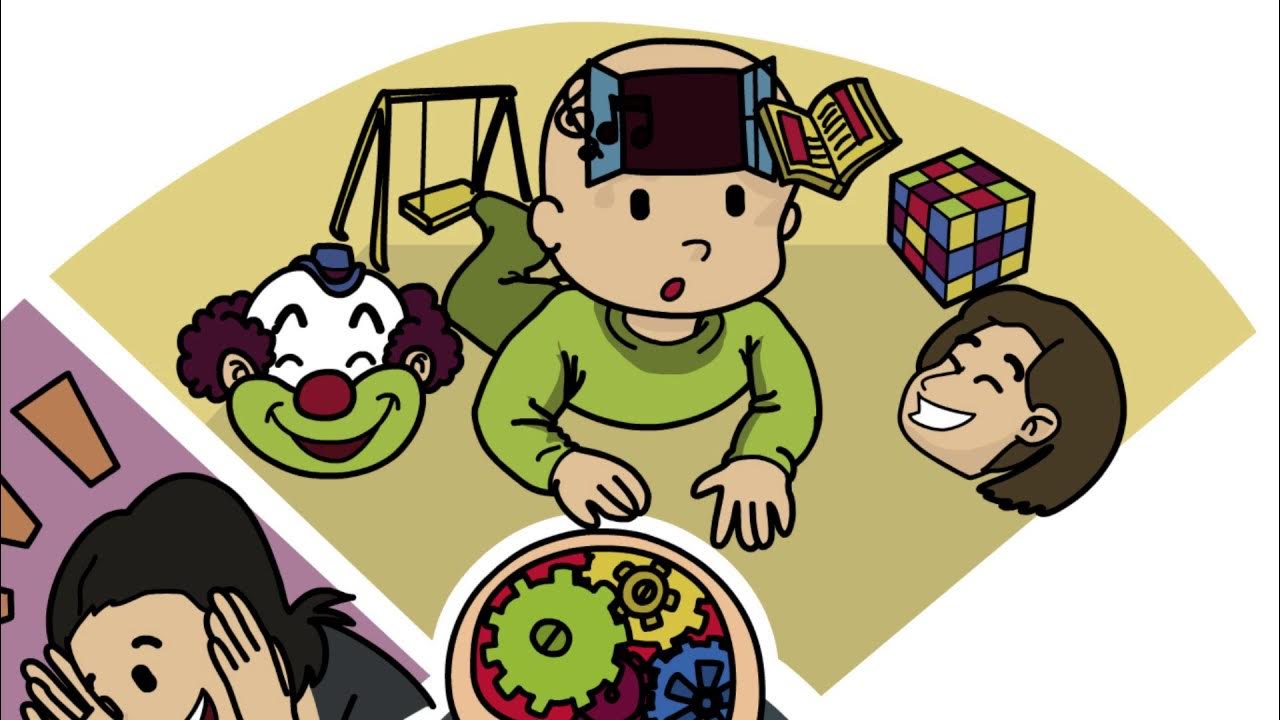Child Development Core Story, Part 1: Brain Architecture
Summary
TLDRThis video explores the critical role of early brain development in shaping a child’s future. It highlights how responsive parenting, stimulation, and early care influence brain architecture, leading to long-term learning outcomes. The script underscores that the brain forms its foundation during the first few years, with pivotal stages occurring by age two. The connection between early childhood experiences and later academic success, such as third-grade reading scores, is explored. It also addresses the gap between scientific knowledge and real-world practices, emphasizing the need for nurturing environments to support brain growth and academic readiness.
Takeaways
- 😀 The brain contains nearly 40 billion neurons and 100 trillion synapses, allowing us to perceive and interact with the world around us.
- 😀 Early brain development plays a crucial role in shaping our lives, influencing later outcomes like health, education, and behavior.
- 😀 Despite years of research on brain development, there is a gap between scientific knowledge and its application in communities, which affects societal outcomes.
- 😀 Behavioral and learning problems in children often have roots in early childhood, long before they show up in school settings.
- 😀 Children's readiness for school can vary significantly, with some children being more capable of learning due to early developmental factors.
- 😀 Brain development in early childhood is like building a house, where a solid foundation is key, requiring nurturing and responsive adults for optimal brain architecture.
- 😀 Responsive parenting and stimulation are essential for a healthy brain, as neglect can hinder the development of necessary pathways for learning and communication.
- 😀 Pruning, a process where the brain refines and strengthens the most important connections, plays a critical role in the first year of life, improving brain efficiency.
- 😀 By the age of two, children's brains undergo significant developmental milestones, particularly in areas controlling language, hearing, vision, and higher-order reasoning.
- 😀 Predicting later academic performance, like third-grade reading skills, can be done as early as age two, emphasizing the importance of early childhood development.
- 😀 Positive adult interaction, adequate nutrition, and minimal exposure to stress in early childhood improve children's ability to learn and thrive in school.
Q & A
What is the role of the brain in perceiving and interacting with the world?
-The brain allows us to perceive and interact with the world around us by sending nearly 500 messages per second through 40 billion neurons and 100 trillion synapses, enabling our body to function efficiently.
How does early brain development impact a child's future?
-Early brain development plays a critical role in shaping a child's future, as it influences their cognitive abilities, learning potential, behavior, and overall health, which can affect their entire life trajectory.
Why is there a gap between brain science and its application in communities?
-Despite significant research on brain development, there is a gap between scientific knowledge and practical application, which results in adverse societal consequences such as healthcare issues, achievement gaps, and crime.
How do behavioral problems in children often develop before school?
-Behavioral problems in children often develop years before they show up in school, stemming from early childhood experiences that influence behavior, attention, and learning skills.
How can the development of brain architecture in early childhood be compared to building a house?
-The development of brain architecture is like building a house, where a strong foundation is necessary for the structure to be stable. In brain development, responsive and nurturing adults provide the foundation for healthy neural growth.
What is the process of 'pruning' in brain development?
-Pruning is the process where the brain removes unnecessary or underused neural pathways, making the brain's connections more efficient, thus ensuring faster transmission of signals and stronger learning pathways.
What is the significance of the first year of life for brain development?
-The first year of life is critical for brain development, as it is when the brain forms nearly 700 synapses per second, laying the foundation for language, hearing, vision, and movement. Responsive adult interaction is essential during this time.
How does the absence of proper stimulation in early childhood affect a child's brain development?
-Without proper stimulation from responsive adults, a child's brain cannot form the necessary connections, which may result in delayed or impaired brain development, affecting learning and behavior.
What role do early interactions with adults play in language and communication skills?
-Early interactions with adults are crucial for the development of language and communication skills. The brain's language-processing areas experience rapid growth in the first few years, relying heavily on adult engagement to foster healthy development.
How can early childhood experiences predict later academic performance, like third-grade reading scores?
-Early childhood experiences, especially those that involve responsive adult interaction and brain stimulation, have a significant impact on later academic performance. By age two, the brain has already formed crucial connections that predict future abilities, such as reading skills in third grade.
Outlines

This section is available to paid users only. Please upgrade to access this part.
Upgrade NowMindmap

This section is available to paid users only. Please upgrade to access this part.
Upgrade NowKeywords

This section is available to paid users only. Please upgrade to access this part.
Upgrade NowHighlights

This section is available to paid users only. Please upgrade to access this part.
Upgrade NowTranscripts

This section is available to paid users only. Please upgrade to access this part.
Upgrade NowBrowse More Related Video

Childhood Trauma and the Brain | UK Trauma Council

Improving early child development with words: Dr. Brenda Fitzgerald at TEDxAtlanta

TEACH EDUC 101: Physical Development of Infants and Toddlers (PART A)

O NEURODESENVOLVIMENTO INFANTIL

Dampak Sekolahkan Anak Terlalu Dini

How a child's brain develops through early experiences
5.0 / 5 (0 votes)